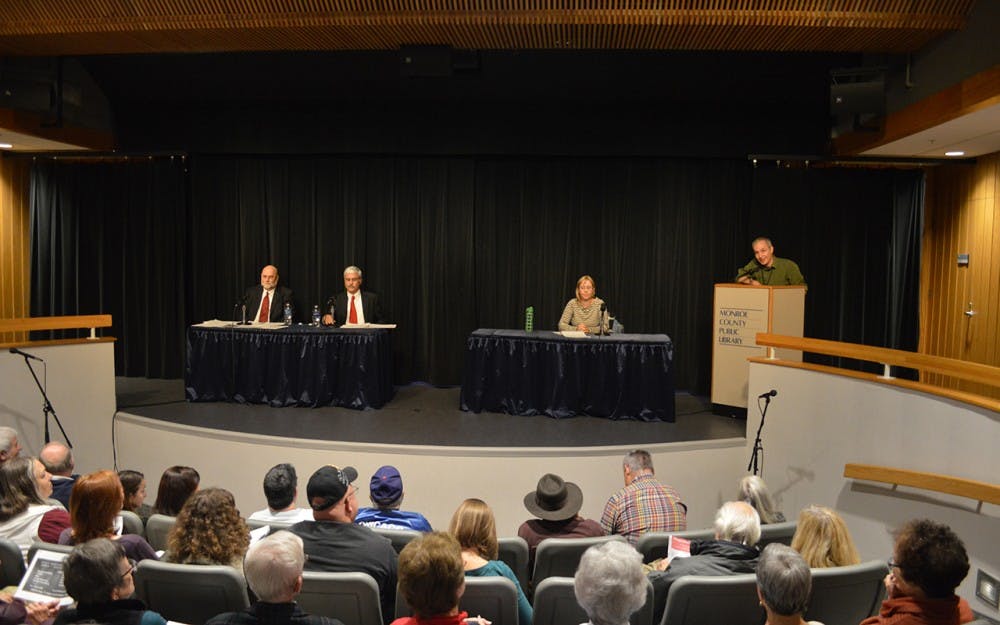The resettlement of new refugees to Bloomington has been delayed after budgeting decisions for refugee resettlement across the nation were postponed until April.
The Bloomington Refugee Support Network, in conjunction with Indianapolis organization Exodus Refugee Immigration, initially planned to begin resettling refugees in March 2017. The application to make Bloomington a refugee resettlement city was approved last September.
Now Diane Legomsky, the coordinator of the Bloomington Refugee Support Network, said the earliest refugees will be arriving is the end of 2017.
Although many of the refugees were expected to be from Syria, after the election of Donald Trump and the naming of his administrationit is now possible that the majority arriving may be Congolese or Burmese instead of Syrian, Legomsky said.
“I’m very worried right now about our new government allowing in refugees from Syria,” she said. “He does have the ability to limit the number of refugees and the authority to limit refugees by country of origin.”
Despite potential limitations on the number of Syrian refugees, Legomsky said she is still optimistic the Bloomington Refugee Support Network will be able to settle refugees by 2018.
[IU professor works to bring refugees to Bloomington | IDS]
In the meantime, the network is working on public advocacy for resettlement in Indiana and helping refugees who are already in the state.
“We are looking into a lot of ways in which our network can be a good force for helping refugees who are already in Indiana,” Legomsky said. “Those that are already resettled could use a lot of help.”

The refugee resettlement program in Bloomington has sparked some controversy in the local community, particularly over the possible settlement of refugees from Syria.
Opponents of Syrian refugee resettlement have raised concerns about Islamic State group affiliation, illnesses and insufficient vetting processes.
“The CIA and the FBI have said that they cannot totally vet these people, and I believe that it is dangerous to allow them here without knowing if there are terrorists among them,” said Phyllis Finley, the president of the Monroe County Republican Women’s Club and member of the refugee opposition group Grassroots Conservatives. “I believe it would be good if the United States of America would help these people where they are — in their own country.”
Syrians, whose arrivals in the United States are most threatened by the new administration, face several challenges, such as language barriers and dealing with the trauma of war, when coming to a new country.
Abdul Baram, who moved out of Aleppo, Syria, almost 50 years ago and is an electrical engineer in Bloomington, can attest to the difficulties Syrians face both inside their own country and once they arrive in the U.S.
In addition to struggling to survive and finding basic necessities in Syria many people live under the threat of attack every day.
“They have no jobs, their house has been hit, children killed, so they got hit in many ways,” Baram said. “Economically there’s no job, their homes have been destroyed, and children, some of their relatives as well, killed, and they do not have alternative resources to support themselves.”
The civil war in Syria has caused nearly five million refugees to flee their home country and has internally displaced more than six million more, according to the United Nations High Commissioner for Refugees.The U.S.‘s current yearly quota for Syrian refugees is placed at ten thousand people, which leaves most people to escape to the geographically closer Europe or Turkey if they are financially able to leave Syria, according to the United Nations High Commissioner for Refugees.
“The whole entire international community, they deserted the Syrians,” Baram said. “The Syrian people are victims — victims of the civil war that is going on in their country and victims of the international community that does not provide enough at least to survive.”
[IU student fights to provide medical treatment for refugees | IDS]
Although groups such as Grassroots Conservatives have spoken against the potential arrival of refugees, the Bloomington community has been largely supportive and welcoming, Legomsky said.
“We have the resources. We have a community that is more than ready and happy to accept them,” Legomsky said. “We can help them not only with love and passion but also with resources.”
Even if no federal funding is allocated to refugee resettlement, groups like Exodus Refugee Immigration and the Bloomington Refugee Support Network have other resources available. The network will have a private meeting later in the month to discuss its next steps.



